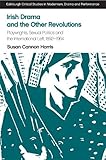Irish Drama and the Other Revolutions : Playwrights, Sexual Politics and the International Left, 1892-1964 / Susan Cannon Harris.
Material type: TextSeries: Edinburgh Critical Studies in Modernism, Drama and Performance : ECSMDPPublisher: Edinburgh : Edinburgh University Press, [2022]Copyright date: ©2017Description: 1 online resource (280 p.) : 3 B/W illustrationsContent type:
TextSeries: Edinburgh Critical Studies in Modernism, Drama and Performance : ECSMDPPublisher: Edinburgh : Edinburgh University Press, [2022]Copyright date: ©2017Description: 1 online resource (280 p.) : 3 B/W illustrationsContent type: - 9781474424479
- 822.91099417 23
- PR8789 .H39 2017
- PR8789 .H39 2017
- online - DeGruyter
| Item type | Current library | Call number | URL | Status | Notes | Barcode | |
|---|---|---|---|---|---|---|---|
 eBook
eBook
|
Biblioteca "Angelicum" Pont. Univ. S.Tommaso d'Aquino Nuvola online | online - DeGruyter (Browse shelf(Opens below)) | Online access | Not for loan (Accesso limitato) | Accesso per gli utenti autorizzati / Access for authorized users | (dgr)9781474424479 |
Frontmatter -- CONTENTS -- ACKNOWLEDGEMENTS -- INTRODUCTION -- 1 DESIRING WOMEN: IRISH PLAYWRIGHTS, NEW WOMEN AND QUEER SOCIALISM, 1892–1894 -- 2 ARRESTED DEVELOPMENT: UTOPIAN DESIRES, DESIGNS AND DEFERRALS IN MAN AND SUPERMAN AND JOHN BULL’S OTHER ISLAND -- 3 WE’LL KEEP THE RED FLAG FLYING HERE: SYNDICALISM, JIM LARKIN AND IRISH MASCULINITY AT THE ABBEY THEATRE, 1911–1919 -- 4 MOBILISING MAURYA: J. M. SYNGE, BERTOLT BRECHT AND THE REVOLUTIONARY MOTHER -- 5 THE FLAMING SUNFLOWER: THE SOVIET UNION AND SEAN O’CASEY’S POST-REALISM -- EPILOGUE: WHAT THE IRISH LEFT – SEAN O’CASEY, SAMUEL BECKETT AND LORRAINE HANSBERRY’S THE SIGN IN SIDNEY BRUSTEIN’S WINDOW -- WORKS CITED -- INDEX
restricted access online access with authorization star
http://purl.org/coar/access_right/c_16ec
Reveals the untold story of Irish drama’s engagement with modernity’s sexual and social revolutionsThe first modern Irish playwrights emerged in London in the 1890s, at the intersection of a rising international socialist movement and a new campaign for gender equality and sexual freedom. Irish Drama and the Other Revolutions shows how Irish playwrights mediated between the sexual and the socialist revolutions, and traces their impact on left theatre in Europe and America from the 1890s to the 1960s. Drawing on original archival research, the study reconstructs the engagement of Yeats, Shaw, Wilde, Synge, O’Casey, and Beckett with socialists and sexual radicals like Percy Bysshe Shelley, William Morris, Edward Carpenter, Florence Farr, Bertolt Brecht, and Lorraine Hansberry. Key FeaturesArgues for and models a way of reconciling Marxist politics with identity politics, instead of privileging one over the otherOffers the first sustained investigation of Irish drama’s engagement with left culture in Europe and North AmericaOffers fresh readings of canonical plays by major authors while elaborating a new and generative argument about Ireland’s contribution to modern drama and literary modernismUses hard-to-find archival sources to recover and reinterpret crucial but forgotten and/or misunderstood moments in theater history and in the history of the cultural leftBrings Marxist and feminist/queer theoretical concerns together to produce a nuanced and revealing account of the interaction between sexual and social politics in the first half of the twentieth century
Mode of access: Internet via World Wide Web.
In English.
Description based on online resource; title from PDF title page (publisher's Web site, viewed 29. Jun 2022)


